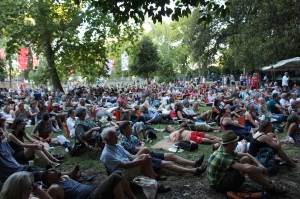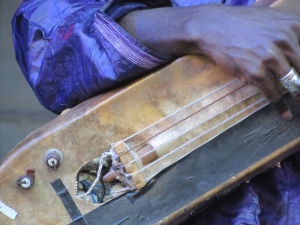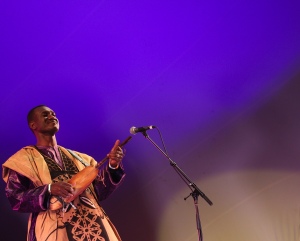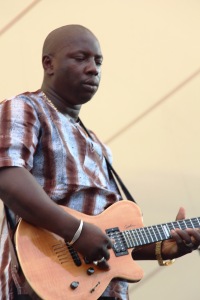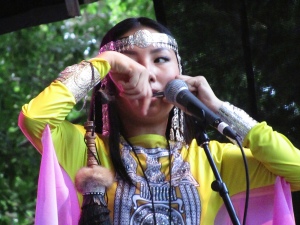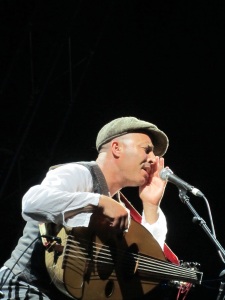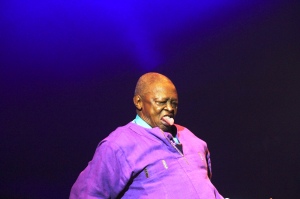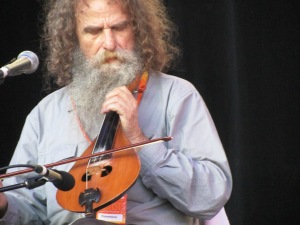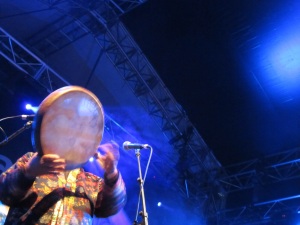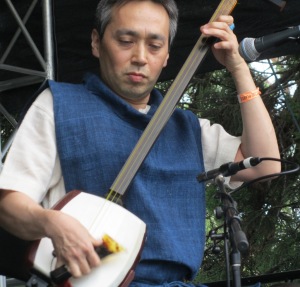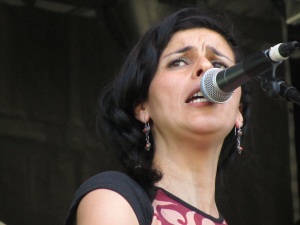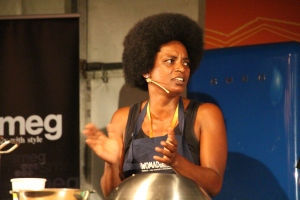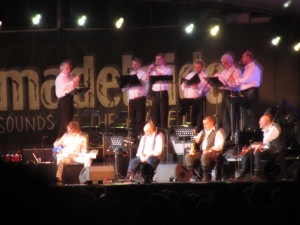Womadeliade 2013 is a family affair. The lush botanical gardens brimming with master musicians of strange obscure and ancient instruments from all over the world. They’re playing with their clan, who will no doubt inherit the traditions and continue the legacy, ultimately becoming masters themselves. Yet families are a curious beast, and on the surface some of these transitions appear to be occurring a little smoother than others.
Perhaps the most anticipated family of this year’s festival is Malian outfit Bassekou Kouyate and Ngoni Ba. Bassekou Kouyate is the master musician of the ngoni, a stringed lute like instrument that he and the rest of his band play, whilst his wife sings. Of course we’ve seen the ngoni repeatedly over the years at Womadeliade, playing with the likes of fellow Malian Rokia Traore, but it’s never been the sole focus. On the big Stage 1 they’re larger, and much more bombastic than their three studio albums suggest. The texture of the amplified ngoni is of course remarkable, a sound imbued with centuries of tradition, and it’s nothing short of West African musical hypnotism.
Over the next three days on various stages, they’re much more relaxed, particularly during the days of extreme heat, where the influence of the banjo, and in particular his previous tour mate Bela Fleck becomes more apparent. “No guitar’s here,” he says two days later in halting English. “Ngoni, African guitar.” Bassekou though is very much influenced by guitar, in fact with his family settling on a repetitive groove as he solos over the top it’s difficult not to be reminded of Neil Young and Crazy Horse. A look at his feet reveals he’s using a wah wah pedal, and this is the beauty, Bassekou exemplifying the possibilities of the traditions colliding headlong western approaches. When mid solo he taps into classic Fela Kuti, the look on his face is pure ecstasy.
Fellow Malian, Vieux Farka Toure, son of legendary Niger delta bluesman Ali Farka Toure is heading off in his own direction. He last toured Australia a few years back, and whether it’s due to the strife in Mali, and an inability to get his regular band, or an attempt for crossover appeal, he’s now stripped down his band to a New York duo of drums and bass. The change has resulted in a big rock sound, to the extent that he’s now playing the kind of music that wouldn’t be out of place at Soundwave. What’s most curious is that he personally isn’t playing any differently, still drawing out those incredibly lyrical electric guitar riffs that have him heralded as the Hendrix of Mali.
Ayarkhaan are a trio of Siberian women whose ethereal, almost cosmic vocals and harmonies preserve the legacy of the indigenous people of the Sakha Republic. Dressed in exotic opulent finery with jewelled headbands and brightly coloured ornate dresses, their sound and presence would be enough, yet one totally unexpected element pushes it over the edge into genius: The Khomus, or Jews Harp. When the three of them pull out this instrument, reach around their faces and begin twanging in unison, murmurs of astonishment ripple through the audience. It’s a remarkable sound, their tempos coming from the gate of the horses as they gallop across the Siberian plains. Yet there’s something else. These women have clearly been influenced by contemporary techno music. The collision between the Siberian traditions and electronic music is astounding. They breathe into the microphones, conjuring up a bleak and cold Siberian plain, causing an involuntary shiver on a 33-degree day. Truly one of the strangest and most remarkable acts on this year’s bill, you need to Google them – you wont be disappointed.
We though that we knew what “Steaming with the [insert band name here] quartet” meant from numerous jazz records over the years, but we’re ill prepared for the punishing mid 30’s heat in the botanical gardens on the Saturday. The grass is sticky; the air is thick and heavy. It’s almost impossible to move. Thankfully a thick blanket of clouds shields the sun, though when it occasionally peaks through it burns like hellfire. Tunisian oud player Dhafer Youssef and his jazz band are literally steaming on stage. The band though seems unfazed, delivering an astoundingly bold fusion of Middle Eastern oud and free jazz. Youssef too is blessed with an amazing falsetto, cupping a hand over his mouth like he’s about to whisper, before delivering a heartbreakingly sad high-pitched vocal that no one in the audience seems to know how to take. It’s another one of those mesmerising Womadelaide performances that really challenge your understanding of how music should work.
Earlier in the day Hugh Masekala talks of hanging out with Duke Ellington who bought him a winter coat, and going to school with Herbie Hancock. On Stage 1 later in the evening he owes more to Louis Armstrong, with an almost stand up comedy shtick between tunes. Later during his set he covers Fela Kuti’s African Woman, drawing it out in his unique glossy South Africa nu jazz style.
Greece’s Psarantonis, growls death metal style into the microphone, though spends most of the time away from the mic fiddling with the tuning of his Cretan Lyra, of which he is apparently a master. His family band, with a bemused Jim White (Dirty Three) as a ring in on percussion, seems to play better without him. It’s rough and ready improvisation, aimless and instantly forgettable set that makes one wonder whether all ancient traditions are worth preserving, or even handing down, as his family attempt to assert their own musical skills when mid set Psarantonis inexplicably gets up and walks off stage.
80-year-old Tajikistan percussionist Allo Alaev, who immigrated to Israel in 1991, is a case in point. After a distinguished career he formed The Alaev Family band, populating it with his progeny. With a sound that incorporates electric violin, Turkish clarinet and relentless percussion, they’re huge and bombastic, in your face entertainment that’s unremitting to the point of being almost overwhelming. Allo is tucked to the left of the stage, though whenever he plays he’s doubled by one of his children. After a couple of songs he sits down and spends the remainder of the set staring mournfully at the audience, as if to say ‘you don’t understand the hell I’m going through for my family.’ Peculiarly this dynamic only adds to the enjoyment, the music is great and the rest of the family members are over the top showman, to the point where one of them feels no qualms about pulling out a didgeridoo. A couple of days later at the workshop they go too far, Allo isn’t present and the rest of the family are too cute, too desperate to entertain, too cheesy, which is a shame because they’re amazing percussionists, yet they ruin it with lame showbiz shtick. As they slapstick around stage it’s impossible not to ponder what Allo would think.
Jimmy Cliff starts well with the title track from his movie The Harder They Come, and some pure skanking reggae from a band in matching t-shirts, yet quickly descends into forgettable cheesy 80’s covers with as much edge and energy as a pantomime.
Japanese duo Shunsuke Kimura & Etsuro Ono are another ensemble both influenced by the banjo and marrying traditions and contemporary music. Their weapon of choice, the tsugaru shamisen comes across one moment as stately court music the next an Eastern hillbilly freak-out. It’s another example of not only the traditions colliding with the contemporary, but the elephant in the room at this years festival: the all encompassing influence of the banjo. When they play a halting take on Waltzing Matilda the crowd goes wild.
Whilst Souad Massi’s peculiar breezy form of Algerian country pop, with its almost Zimbabwean rhythms takes some getting used to, it is her guile that’s astounding. As the mc wanders on stage attempting to close the show, Massi basks in the applause of the crowd wanting to continue. But if there’s one thing we know about Womadelaide it’s that there are no encores under any circumstances. Yet the sheer force of Massi’s personality, pushes the MC back off the stage. “I’ve got the power,” she screeches with delight, before exercising it by leaving the stage for about five minutes as her band play a power ballad.
“She learnt Swahili from the spirits while in a trance,” offers the translator. The audience claps politely. Reunion Island singer Christine Salem is in the Taste of the World tent, cooking Chicken Cari with a tomato rougail. Her band help out initially, before losing interest, grabbing the water cooler to use as a percussion instrument, banging pots and pans, and shaking their unique square shaker and chanting. Between answering questions about her childhood and how much chilli to add, Christine joins in, her mix of Creole, and Swahili vocals truly captivating. This is one of the most intimate performances of the festival, unplanned, off the cuff. It feels like we’re in her kitchen, in her world. “When you all get together is this what you do? Just cook and make music?” Asks the moderator. Christine just smiles as if to say ‘what else is there?’ Then she feeds us chicken.
Perhaps one of the most remarkable performances of the festival is also the last, Serbian composer Goran Bregovic. The Stage 1 finale can often be the scene of some of the more commercially popular music, or at the very least, a place for a last chance feel good boogie. Yet Bregovic seems to sum up the scene and elects to go in the opposite direction. He begins by recreating the remarkable scores to some of his films with Emir Kusturica, with beautiful meditative strings, a vocal choir, restrained horns and percussion – in short subtle gorgeous classical Balkan music from his Weddings and Funeral Orchestra. It’s the kind of music you never get to see live. This is music for the concert hall, complex and emotional. And just when we think that Bregovic’s gone all upscale, he kicks into the Balkan gypsy music that has made him famous, larger than life brass with a huge rumbling bottom end – energetic party music that toys with the soul. Most of his tunes came from his recent Champagne for Gypsies (Cartell), with him singing all of the collaborations with the likes of the Gypsy Kings and Gogol Bordello. Live the tunes come to life, they’re big bold and life affirming, yet even here, perhaps because we’re more attuned, the complexity of his arrangements continue to astound.
As we wander exhausted from the gardens for the last time, Bregovic’s incredible sounds collide with four days and nights of unique cultural discoveries, of strange unexpected sounds, of bizarre fusions, of curious family dynamics, tasty food and extreme heat. This year has been more arduous than most, but the rewards have been plentiful. All you have to do is be open to the unknown. See you next year.
